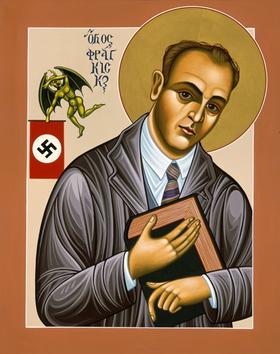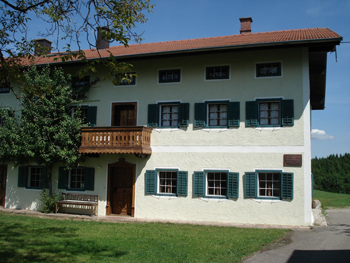If you want a movie to watch over the holidays, I have a suggestion. The director Terrence Malick has a new film called A Hidden Life that opens nationwide on December 13. It was nominated for the Palme d'Or at the 2019 Cannes film festival. What fascinates me about this movie is how its protagonist stands in sharp contrast to the characters in Malick's most recent work. And for those who have long wondered whether the famously private Malick is a Christian, A Hidden Life will provide more grist for the mill.
In his recent trilogy of films, Malick has explored the lives and worldviews of what you might call Hollywood hipsters. These people are young, attractive, wealthy, and decidedly secular. Their lives look fun. They make your own life feel dull and boring. You almost envy them.
 |
|
Icon depicting Franz Jägerstätter.
|
In Knight of Cups (2015), a self-indulgent LA screen writer (Christian Bale) drifts through the movie staring into space and searching for some meaning. Rick is deeply lost. One of his six women challenges him: "You don't want love, you want a love experience." He laments how he's "spent thirty years ruining my life instead of living it. Where did I go wrong? All those years living the life of someone I didn't know. I can't remember the man I wanted to be." The fragments of his life lack any coherent narrative: "You think when you reach a certain age things will start making sense, and you find out that you are just as lost as you were before. I suppose that's what damnation is. The pieces of your life never to come together, just splashed out there." Rick lives in a world "with no principles, only circumstances."
Then there's Song to Song (2017). Like the other two films, there's no linear narrative, just a succession of dreamy film fragments with whispery voice overs. This story follows two couples in Austin, Texas (Malick's home town). These lost prodigals specialize in hedonistic excess. But the end is never in doubt — however superficially enviable, a life dedicated to wanton pleasure is a spiritual train wreck waiting to happen. "I revolted against goodness," one character admits. Says another, "I never thought of myself as a person who needed mercy."
But life in this pagan paradise comes at a cost. In To the Wonder (2012), Javier Bardem plays a priest who struggles with all the pain, sorrow, and degradation that he observes: "All I see is failure, destruction, and ruin." The last line of the movie, though, offers a glimmer of hope: "Love that loves us, thank you."
There's no judgmentalism in these three films, only a deep sort of sadness. Having lived in this sub-culture for fifty years, Malick speaks from personal experience. Rather, his trilogy offers a lament for so much of what drives our contemporary culture — sex, money, power, and prestige.
Malick now gives us the good news in A Hidden Life (2019). His newest film depicts the improbable witness of one of the most courageous Christians that you've never heard of: a peasant farmer from Austria with an eighth-grade education.
Franz Jägerstätter (1907–1943) was born "out of wedlock" in a small village near Salzburg. His mother was a maid, and his father was a farmer. After his father was killed in World War I, and his mother remarried in 1917, Jägerstätter took the last name of his step father. Like many people of that time and place, he lived a hard life as a miner, a farmer, and, if legend is right, a hell raiser.
But his life changed dramatically when, on Maundy Thursday in 1936, he married a devout Catholic woman named Franziska Schwaninger (1913–2013). Under her influence, the couple made a pilgrimage to Rome. Jägerstätter began to study the Bible and the lives of Christian saints. He became the sacristan (sexton) of his local church. They had three daughters.
In 1938, German troops entered his village of Radegund. In April of that year, Jägerstätter was the only person in Radegund to vote against Hitler's annexation of Austria. He openly protested the Nazis. After four deferrals from military service, on June 17, 1940, Jägerstätter was conscripted into the German army. But he refused to take the oath to Hitler, despite pressure from his fellow villagers and the church bureaucrats to obey the orders and get into line.
Jägerstätter was arrested and imprisoned as a conscientious objector on March 1, 1943, despite his willingness to serve as a medic. He was accused of Wehrkraftzersetzung — undermining the military morale, and sentenced to death in a military trial. On August 9, Jägerstätter was executed by guillotine at the age of thirty-six.
 |
|
Jägerstätter farmstead in St Radegund.
|
Given Malick's earlier trilogy of films, The Hidden Life is like a three-hour cinematic meditation on 1 Corinthians 1:18ff: "Where is the wise man? Where is the scholar? Where is the philosopher of this age? Has not God made foolish the wisdom of the world? Brothers and sisters, think of what you were when you were called. Not many of you were wise by human standards; not many were influential; not many were of noble birth. But God chose the foolish things of the world to shame the wise; God chose the weak things of the world to shame the strong. He chose the lowly things of this world and the despised things to nullify the things that are."
For many years Jägerstätter was viewed as an unpatriotic traitor, especially in his home town. He was criticized for deserting his wife and children. Radegund refused to include his name on the local war memorial, and his wife Franz was denied a pension until 1950.
Things began to change in 1964, when Gordon Zahn published his biography about Jägerstätter called A Solitary Witness. There followed an Austrian television movie in 1971 called The Refusal, and then a 24-minute movie in 2009 called Franz Jaegerstaetter: A Man of Conscience. In 2007, Jägerstätter was declared a martyr and beatified by the Catholic Church (one step away from sainthood).
In telling Jägerstätter's story, Malick is just warming up to his task. He's already shooting his next film. It's called The Last Planet, and it tells the story of Jesus in a series of parables. Perhaps this should not surprise us.
In discussing his own film Silence (2016) that's based on the novel by Shusaku Endo, Martin Scorsese reflected on his own journey toward a mature Christian faith: "Ultimately, it’s about the struggle toward the very essence of faith–not certainty. The kind of thing I dealt with here and in Kundun and The Last Temptation of Christ is not fashionable, but it doesn’t mean it isn’t true. It doesn’t mean we don’t do it with conviction. It doesn’t mean there isn’t room for it. Terrence Malick wrote me a letter after seeing Silence, and he said, “What does Christ want from us?”(FN)
For more on Franz Jägerstätter, see the two books by Erna Putz, Franz Jagerstatter — Martyr: A Shining Example in Dark Times (2007), and Franz Jägerstätter: Letters and Writings from Prison (2009).
Footnote: https://thefilmstage.com/features/martin-scorsese-breaks-down-five-iconic-scenes-from-his-career/
Dan Clendenin: dan@journeywithjesus.net
Image credits: (1) and (2) Wikipedia.org.



